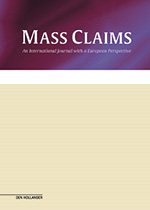Country reports
England & Wales, France, Germany, Italy, The Netherlands, Scotland, Spain and Portugal
England and Wales
Anna Dannreuther and Rhea GuptaCase law
Christine Riefa Class Representative Limited v Apple Inc and Amazon.com Inc 2025 CAT 5
On 14 January 2025, the Competition Appeal Tribunal ("CAT") handed down a landmark judgment refusing to grant a collective proceedings order on the grounds that the Tribunal was not satisfied that the class representative was suitable.
England and Wales has a comprehensive statutory regime for opt-out collective proceedings for claims for damages in competition law.1 Under this regime, collective proceedings are only permitted to proceed to trial if the CAT has granted a collective proceedings order ("CPO").2 A key condition for granting a CPO is the authorisation of the proposed class representative ("PCR");...
U heeft op dit moment geen toegang tot de volledige inhoud van dit product. U kunt alleen de inleiding en hoofdstukindeling lezen.
Wanneer u volledige toegang wenst tot alle informatie kunt u zich abonneren of inloggen als abonnee.


